How does the IAH support fixed-term faculty?
August 1, 2018 | Philip Hollingsworth, Ph.D., IAH Program Administrator
 The Institute for the Arts and Humanities (IAH) has a national, thirty-year reputation of supporting UNC’s faculty through community building programs that propel scholarship and leadership development.
The Institute for the Arts and Humanities (IAH) has a national, thirty-year reputation of supporting UNC’s faculty through community building programs that propel scholarship and leadership development.
In 2013, the IAH expanded its programming to offer support throughout a faculty member’s career including their first years at UNC, their next steps after receiving tenure, as well as the experience just before and after retirement.
The mission of the IAH—which we recently spent over a year distilling to one sentence— is to “empower faculty to achieve their full potential by creating community and cultivating leadership.” I believe we do a great job of fulfilling this mission for the UNC College of Arts and Sciences’ tenure-track faculty. As an administrator of these programs for almost three years, I have worked to ensure the breadth, scope, and high quality of these programs, along with the support of my fellow IAH staff members and our faculty-appointed program directors. I truly believe in the efficacy of the programs at the IAH, and in particular, our fellowship programs. The Faculty Fellowship Program offers a semester-long residential research leave, and the Academic Leadership Program is one of the only academic leadership development programs in the nation that focuses on its own faculty.
As mentioned before, we perform well supporting the tenure-track faculty that comprises about 70 percent of faculty in the College. But what about the other ~30 percent of full-time faculty not on the tenure track? How does the IAH support fixed-term faculty?
Fixed-term faculty refers to full-time faculty that are not on the tenure track and receive limited-term contracts, some starting out for only one to three years. Academic ranks of fixed-term faculty may include lecturer, instructor, or visiting assistant professor. In most cases in the College, fixed-term faculty hold a Ph.D., meaning that they have had the same academic training as tenure-track professors. Fixed-term faculty members also often teach more classes and students than those on the tenure track. I spoke with a fixed-term faculty member in the College who taught 1,500 students during the 2017-2018 academic year alone!
Unfortunately, there historically has been a stigma of the teaching-intensive instructor or lecturer titles, in comparison to the more “prestigious” titles such as assistant or associate professor. With the guidance of the Fixed-Term Faculty Committee (Office of Faculty Governance), at UNC the title of lecturer has fortunately been changed to teaching professor, which is a better representation of the skills and credentials of these fixed-term faculty members.
Supporting fixed-term faculty
Returning to the question from before: how does the IAH support fixed-term faculty? Officially, we do not exclude fixed-term faculty from our programming. For example, if a College faculty member is new to UNC’s campus, they are welcomed immediately to the New Faculty Program. Additionally, teaching associate professors and teaching professors are welcome to apply to our fellowship programs. In reality, however, our efforts for inclusion do not represent the 70/30 approximate split of College faculty. Despite reaching out to new fixed-term faculty, many of our informational lunches are centered around strategies of advancing in scholarship and the process of “going up for tenure,” something that is not relevant to a teaching professor’s promotion and professional development. Thus, we are impeding participation from fixed-term faculty. To date, few fixed-term faculty members have completed our leadership development programming, and many of these fellows were from outside the College.
I recognize this suggests the IAH excludes fixed-term faculty from its programs. However, I want to highlight that historically our programming is designed for and is a benefit to faculty on the tenure track. After all, these programs were created by tenure-track faculty for tenure-track faculty. With the success of these programs, what if the IAH could provide intentional support for teaching professors now and in the future?
With the full support of IAH leadership, I propose a peer summit of fixed-term faculty of the College of Arts and Sciences to convene at Hyde Hall in September and October of this coming fall semester. From these two meetings, I hope to ascertain: 1) the most salient issues facing fixed-term faculty at UNC and 2) how the IAH could support them in resolving these issues. I will be reaching out to fixed-term faculty to help me organize this summit and lead discussions, as well as making interdisciplinary connections across campus. My hope is that this effort will lead to a community-based initiative—by fixed-term faculty, for fixed-term faculty—that will make the biggest impact on our teaching professors’ professional careers, and thus increase the quality of instruction, scholarship, and leadership of this state university.
Join us at our summit for fixed-term faculty in the University Room in Hyde Hall, Friday Sept. 28th from 12:30 – 2 p.m. More information to come.

